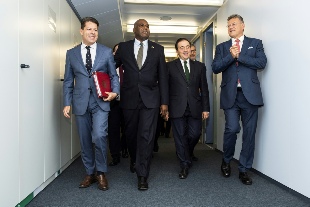
|
The British government is preparing to lodge a formal complaint with Spain over Gibraltar. Spanish military aircraft have twice flown over the Rock in the past ten days: once on 27 September, reportedly while a commercial British Airways flight was taxiing on the local airport’s runway, and then again on 30 September. These flyovers (thought to have been by Spanish Air Force cargo aircraft) might seem harmless – but the British government disagrees. The timing of the flyovers couldn’t be worse. They come shortly after the latest
round of talks in Brussels between Spain, Gibraltar, the UK and EU about the Rock’s
post- Spain wants ‘joint use’ of Gibraltar’s airport – but for Damid Lammy, the UK’s foreign
secretary, the practical implications of such an arrangement are far from clear.
Somewhat ridiculously, in last month’s talks, the various parties discussed where
security guards should stand in the airport and even what colour uniforms they should
wear. Yet these apparently trivial points are symbolic of a much deeper dispute –
one that ultimately rests on the phrasing of a 300 year- All parties now agree that passport control should take place in the airport, but
Lammy is wary of such demands. At last month’s meeting, he reiterated that the independence
of the British RAF base, which operates the territory’s runway, must not be compromised
by any agreement on airport use and border control. Defence is one of only two areas
in which Gibraltar is controlled from London, the other being foreign policy; in
all other respects, the British Overseas Territory is self- Lammy has taken over from where his predecessor Lord Cameron left off in April. After that month’s discussions, Gibraltar’s chief minister Fabian Picardo said that all parties were ‘within kissing distance’ of a permanent agreement on issues such as the airport, goods and mobility. But after Lammy’s visit to Brussels last month, it looks like progress has slowed once again. Part of the problem is that Spain wants much more than just joint control of Gibraltar’s
airport. Citing the UN’s definition of the Rock as a ‘non- Signed in 1713, the Treaty of Utrecht transferred ‘the city and castle of Gibraltar, together with its port, defences and |
|
|
fortresses’ from the Spanish to the British’. But, says Spain, that document made
no reference to the isthmus, the thin strip of land that connects the Rock to Andalucia
– on whch the territory’s civilian and military airports stand – nor to the seas
around the territory or the airspace above it. Therefore, according to the Spanish
government, ‘the occupation of the isthmus [by Britain] is illegal and contrary to
international law’. This centuries- One might expect Spain to have pounced upon any opportunity to expose what it sees as the Treaty’s disastrous omissions. But in 1966, when the UK invited Spain – then ruled by dictator Francisco Franco – to resolve the issue of Gibraltar’s status at the International Court of Justice, the latter refused. Were the Spanish concerned that their archaic arguments about the isthmus wouldn’t survive scrutiny in The Hague? If so, this concern seems to have been justified. In 2016, the international Court of Arbitration for Sport ruled that ‘under public international law, the sovereignty of Gibraltar is clearly British’. Picardo, Gibraltar’s chief minister, has been equally emphatic: ‘The concept of joint sovereignty or any dilution of our sovereignty is a dead duck’, he said in 2019. That same year, however, I wrote an article arguing that a post- Certainly, Spanish claims to the Rock don’t reflect the interests of Gibraltarians.
In two referendums, held in 1967 and 2002, they overwhelmingly rejected the prospect
of control from Madrid, opting in both cases to remain as a British Overseas Territory.
Franco was so unsettled by that first vote, and the strongly pro- The dispute that Lammy has just entered is not primarily about Brexit, although of
course it has been complicated by that vote. Gibraltar’s airport, located as it is
on that crucial strip between the Rock and Andalucia, is the modern focal point of
a 300 year- |


